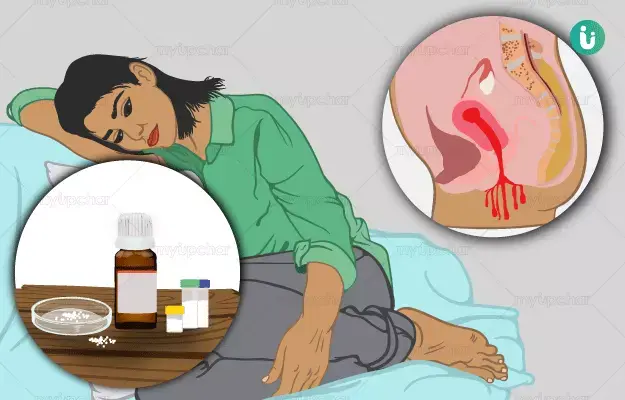MENORRHAGIA
TREATMENT
In Mumbai

We all know that the monthly menstrual cycle brings a lot of cravings, emotions, and, a few times, tremendous challenges. Among these challenges, menorrhagia, or intense menstrual bleeding, is a common but toughest one. From waking up to stained sheets to frightening social events, menorrhagia can affect your daily life significantly.
Imagine you have a crucial client presentation at work. Still, you are consistently tense about leakage and discomfort because of your heavy menstrual flow. Your condition would be shaken, and you will find it tough to concentrate on your work, turning your office day more challenging than it needs to be. Sadly, this experience is not unique, as menorrhagia can create several issues you must deal with.
Suppose you have experienced the inconvenience and frustration of menorrhagia. In that case, you know how irritating it can be to your day-to-day life. But with advanced medical science, efficient menorrhagia treatment in Mumbai is accessible. So, if you are tired of canceling plans due to intense menstrual bleeding, be prepared to learn more about menorrhagia treatment in Mumbai with the help of this article.
What is menorrhagia?
Menorrhagia or heavy menstrual bleeding is when your periods are prolonged or heavy. “Heavy” means that your period lasts more than seven days or you lose more blood than usual menstruation. You might bleed exceedingly and must change your pad or tampon for several hours back to back.
What are the symptoms of menorrhagia?
The menorrhagia symptoms can differ from woman to woman, but a few common indications might include the following:
Excessive bleeding
Menorrhagia is usually defined as soaking through a tampon or pad every hour for consecutive hours or using double protection like a tampon and a pad to manage the bleeding. Prolonged periods Periods that stay more than a week are usually considered prolonged and might be a menorrhagia symptom.
Clots
Passing huge blood clots during your menstruation can be a menorrhagia symptom. These clots might be more significant than a quarter in size.
Weakness and fatigue
Menorrhagia can lead to excessive blood loss, resulting in weakness, fatigue, dizziness, or lightheadedness.
Discomfort and pain
Menorrhagia might accompany cramping, pelvic pain, and discomfort during your periods.
Anemia
Because of the blood loss, menorrhagia can cause anemia, leading to shortness of breath, weakness, and pale skin.
Note: The frequency and severity of these symptoms might vary for every patient. Talking to a professional gynecologist for precise diagnosis and proper menorrhagia treatment in Mumbai is always suggested.
What are the causes of menorrhagia?
Menorrhagia can have several causes. A few common causes might include the following:
Hormonal imbalances
Hormonal imbalances, like variance between progesterone and estrogen, can disturb the usual menstrual cycle and cause menorrhagia. Conditions like PCOS (polycystic ovary syndrome), perimenopause, and hormonal birth control techniques can be connected with hormonal imbalances that might lead to menorrhagia.
Uterine fibroids
Uterine fibroids are non-cancerous growths that can evolve in your uterus and lead to menorrhagia. Fibroids might even disrupt the standard function and structure of the uterus.
PID (pelvic inflammatory disease)
PID is an infection of the women’s reproductive organs like ovaries, fallopian tubes, and uterus. It can also lead to scarring and inflammation in your reproductive organs, causing menorrhagia.
Blood clotting disorders
Some specific blood clotting diseases, like, platelet function or Willebrand disease, can lead to menorrhagia.
Other underlying medical situations
Specific medical conditions, like thyroid disorders, bleeding disorders, and liver or kidney disease, can contribute to menorrhagia.
Medical treatments or medications
Certain medications, like, anti-inflammatory medicines or anticoagulants, can increase the chances of menorrhagia. Furthermore, specific medical treatments like IUDs (intrauterine devices) or endometrial ablation can lead to menorrhagia as a side effect.
What is the diagnosing procedure for menorrhagia?
While diagnosing menorrhagia, your doctor will ask questions about your menstrual cycle and medical history.
Your doctor might ask about the following:
- Exact age when you get your first period.
- Your menstrual cycle duration, including how long your period stays.
- Family record of menorrhagia among relatives.
- Your pregnancy history and present birth control methods.
- Any medications you are taking currently, including OTC medications.
Be free to talk about your life’s quality too. Your healthcare provider must know if you have been dualizing menstrual products, avoiding activities, or limiting your life due to menorrhagia.
What tests can be performed to diagnose menorrhagia?
Your gynecologist will conduct a pelvic and a physical exam. Several non-invasive procedures are accessible that can allow your doctor to diagnose the exact cause of your menorrhagia, such as:
A sonohysterogram
A sonohysterogram, called saline-infusion sonography, detects issues in your uterus lining. This procedure lets your doctor view the inside of your uterus while it’s infused with saline. It provides high sensitivity and accuracy when checking abnormalities inside your uterine cavity.
A hysteroscopy
This procedure checks for fibroids, polyps, or different irregular tissue inside your uterus. This test allows your doctor to check your uterus, cervix, and vagina. The gynecologist can pull outgrowths that might be causing bleeding, like polyps or fibroids, at the time of hysteroscopy.
You might have other exams or tests based on your age and how severe your symptoms are. Other tests might involve:
- A blood test to detect anemia signs, thyroid disease, or clotting problems.
- A pap smear to analyze your cervix cells for changes that might indicate cancer.
- Endometrial biopsy to detect uterine tissue for irregularities or other cancer cells.
- Transvaginal ultrasound to determine the appearance of your tissues and organs inside your pelvis.
- MRI (magnetic resonance imaging) to detect uncommon structures in your uterus. This test is only performed when ultrasound doesn't offer sufficient details.
- A cervical culture to check for infection, as indicated by your medical record and the outcome of your physical exam.
What are the available options for menorrhagia treatment in Mumbai?

The precise treatment depends on the exact cause of your heavy bleeding, your age, medical history, and health. Your treatment plan also relies on your response to specific medications and preferences. For example, you might not want to have menstruation at all, or you might want to lower your bleeding. Furthermore, your pregnancy plans will also impact your treatment options. Talk with your gynecologist about your health issues and your treatment goals.
What are the different medications used to treat menorrhagia?
- Iron supplements enhance your iron stores.
- NSAIDs like Aspirin® or Ibuprofen® can calm your cramps and lower your bleeding.
- Birth control pills might help your periods to be more stable and regular.
- Hormone therapy can balance the amount of progesterone and estrogen to treat menorrhagia. Hormone therapy is usually suggested for heavy menstrual flow connected to perimenopause but comes with several risks. Hence you must always consult with your healthcare provider.
What are the procedures used to treat menorrhagia?
Hysteroscopy is a general procedure utilized for treating and diagnosing menorrhagia. During a hysteroscopy, a thin, illuminated tube is placed in your vagina, allowing your doctor to examine your uterine cavity visually. The hysteroscope can also be used as an exact surgical instrument to remove any uncommon growth causing heavy bleeding.
A few other procedures include:
- Myomectomy
This procedure removes fibroids from your uterus.
- UAE (uterine artery embolization)
This procedure helps restrict blood flow to tumors and fibroids.
- Endometrial ablation
This procedure destroys every part of the uterus lining. It’s crucial to understand that your gynecologist might recommend sterilization after an endometrial ablation as it poses risks to your fetus if you become pregnant.
- Hysterectomy
This surgical procedure removes the uterus, preventing pregnancy and periods.
Which is the best place for menorrhagia treatment in Mumbai?
Are you dealing with intense menstrual bleeding? Our professional team at Tasyah Clinic ensures you receive precise menorrhagia treatment in Mumbai. With customized care and leading-edge techniques, Dr. Prashansa Raut is dedicated to offering practical solutions for menorrhagia. Be free from the discomfort of heavy periods, and don’t allow it to hold you back any longer. Book an appointment with us today and take the first step towards finding relief from menorrhagia.

Your Health Matters!!
Let us help you achieve optimal wellness
with our comprehensive women’s healthcare services
